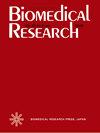Effect of UGT2B7 Gene Polymorphism with Clinical Pediatric Epileptic patients on Sodium Valproate Monotherapy
IF 1.3
4区 医学
Q4 MEDICINE, RESEARCH & EXPERIMENTAL
引用次数: 0
Abstract
Background: Pediatric epilepsy comprises of a chronic neurological disorders characterized by recurrent seizure attack. Sodium valproate is one of the common anti-epileptic drugs used in the treatment. Glucuronide conjugation is the major metabolic pathway of sodium valproate, carried out by the enzyme Uridine 5’-diphospho (UDP) glucuronosyl transferase (UGT) whose genetic polymorphisms may alter clinical outcome. Aim: To find the association between UGT2B7 genetic polymorphism and clinical outcome in terms of efficacy and tolerability in pediatric epileptic patients on sodium valproate monotherapy. Methods and Materials: In this cohort study, 75 pediatric epileptic patients aged 2-18 years receiving sodium valproate monotherapy for past one month were included from Justice K S Hegde Charitable Hospital, Mangalore, India after obtaining informed consent. Genetic polymorphism patterns of UGT2B7 (C161T, A268G, G211T) was evaluated by PCR-RFLP. Clinical outcome was measured in terms of responders and non-responders based on seizure control during the 6 month observation period. Tolerability was measured by estimating the hepatic, renal and other lab parameters. Clinical outcome in different UGT genotypes was compared by Chi square test. P value <0.05 was considered as significant. Results: Out of 75 patients, CC (41.3%), CT (38.7%), TT (20%) pattern was observed in UGT2B7 (C161T) gene, AA(14.7%), AG(42.7%), GG(42.7%) in (A268G) gene and GG(80%), GT(18.7%), TT(1.3%) in (G211T) gene. It was found that there was no statistical difference in clinical outcome with different UGT2B7 genetic polymorphism patterns. Conclusion: We conclude from our study that genetic polymorphism of UGT2B7 doesn’t have any role on the clinical outcome of epilepsy.临床儿童癫痫患者UGT2B7基因多态性对丙戊酸钠单药治疗的影响
背景:儿童癫痫是一种以反复发作为特征的慢性神经系统疾病。丙戊酸钠是常用的抗癫痫药物之一。葡萄糖醛酸缀合是丙戊酸钠的主要代谢途径,由尿苷5 ' -二磷酸(UDP)葡萄糖醛酸转移酶(UGT)进行,其遗传多态性可能改变临床结果。目的:探讨UGT2B7基因多态性与小儿癫痫患者丙戊酸钠单药疗效和耐受性的关系。方法和材料:在本队列研究中,在获得知情同意后,从印度芒格洛尔Justice K S Hegde慈善医院纳入75例2-18岁接受丙戊酸钠单药治疗过去一个月的儿童癫痫患者。采用PCR-RFLP方法分析UGT2B7基因(C161T、A268G、G211T)的遗传多态性模式。在6个月的观察期内,以发作控制为基础,以反应者和无反应者来衡量临床结果。通过估计肝脏、肾脏和其他实验室参数来测量耐受性。采用卡方检验比较不同UGT基因型患者的临床结果。P值<0.05为差异有统计学意义。结果:75例患者中,UGT2B7 (C161T)基因中存在CC(41.3%)、CT(38.7%)、TT(20%), (A268G)基因中存在AA(14.7%)、AG(42.7%)、GG(42.7%), (G211T)基因中存在GG(80%)、GT(18.7%)、TT(1.3%)。不同UGT2B7基因多态性的临床转归无统计学差异。结论:UGT2B7基因多态性对癫痫的临床预后无影响。
本文章由计算机程序翻译,如有差异,请以英文原文为准。
求助全文
约1分钟内获得全文
求助全文
来源期刊

Biomedical Research-tokyo
医学-医学:研究与实验
CiteScore
2.40
自引率
0.00%
发文量
19
审稿时长
>12 weeks
期刊介绍:
Biomedical Research is peer-reviewed International Research Journal . It was first launched in 1990 as a biannual English Journal and later became triannual. From 2008 it is published in Jan-Apr/ May-Aug/ Sep-Dec..
 求助内容:
求助内容: 应助结果提醒方式:
应助结果提醒方式:


